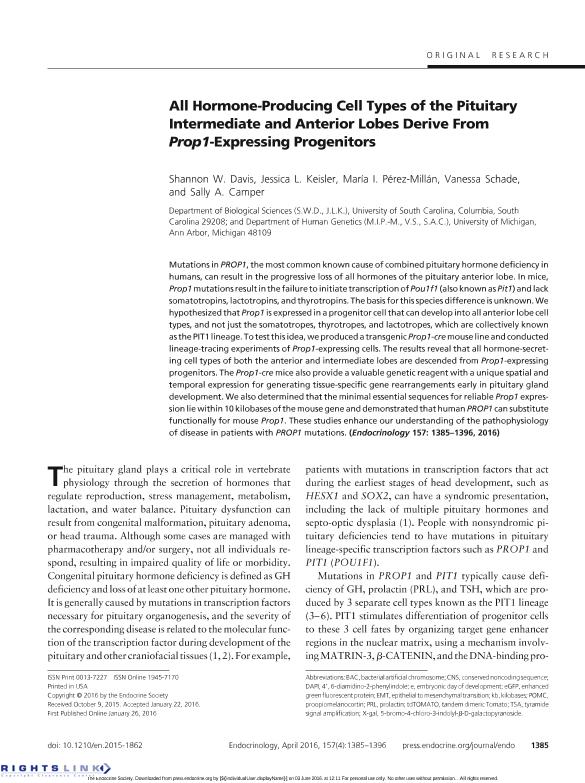Mostrar el registro sencillo del ítem
dc.contributor.author
Davis, Shannon W.
dc.contributor.author
Keisler, Jessica L.
dc.contributor.author
Pérez Millán, María Inés

dc.contributor.author
Schade, Vanessa
dc.contributor.author
Camper, Sally A.
dc.date.available
2018-03-15T20:10:26Z
dc.date.issued
2016-04
dc.identifier.citation
Davis, Shannon W.; Keisler, Jessica L.; Pérez Millán, María Inés; Schade, Vanessa; Camper, Sally A.; All hormone-producing cell types of the pituitary intermediate and anterior lobes derive from prop1-expressing progenitors; Endocrine Society; Endocrinology; 157; 4; 4-2016; 1385-1396
dc.identifier.issn
0013-7227
dc.identifier.uri
http://hdl.handle.net/11336/39001
dc.description.abstract
Mutations in PROP1, the most common known cause of combined pituitary hormone deficiency in humans, can result in the progressive loss of all hormones of the pituitary anterior lobe. In mice, Prop1 mutations result in the failure to initiate transcription of Pou1f1 (also known as Pit1) and lack somatotropins, lactotropins, and thyrotropins. The basis for this species difference is unknown. We hypothesized that Prop1 is expressed in a progenitor cell that can develop into all anterior lobe cell types, and not just the somatotropes, thyrotropes, and lactotropes, which are collectively known as the PIT1 lineage. To test this idea, we produced a transgenic Prop1-cre mouse line and conducted lineage-tracing experiments of Prop1-expressing cells. The results reveal that all hormone-secreting cell types of both the anterior and intermediate lobes are descended from Prop1-expressing progenitors. The Prop1-cre mice also provide a valuable genetic reagent with a unique spatial and temporal expression for generating tissue-specific gene rearrangements early in pituitary gland development. We also determined that the minimal essential sequences for reliable Prop1 expression lie within 10 kilobases of the mouse gene and demonstrated that human PROP1 can substitute functionally for mouse Prop1. These studies enhance our understanding of the pathophysiology of disease in patients with PROP1 mutations.
dc.format
application/pdf
dc.language.iso
eng
dc.publisher
Endocrine Society

dc.rights
info:eu-repo/semantics/openAccess
dc.rights.uri
https://creativecommons.org/licenses/by-nc-sa/2.5/ar/
dc.subject
Prop1
dc.subject
Pituitary
dc.subject
Stem Cells
dc.subject
Cre
dc.subject.classification
Otras Ciencias Biológicas

dc.subject.classification
Ciencias Biológicas

dc.subject.classification
CIENCIAS NATURALES Y EXACTAS

dc.title
All hormone-producing cell types of the pituitary intermediate and anterior lobes derive from prop1-expressing progenitors
dc.type
info:eu-repo/semantics/article
dc.type
info:ar-repo/semantics/artículo
dc.type
info:eu-repo/semantics/publishedVersion
dc.date.updated
2018-03-15T14:04:06Z
dc.journal.volume
157
dc.journal.number
4
dc.journal.pagination
1385-1396
dc.journal.pais
Estados Unidos

dc.description.fil
Fil: Davis, Shannon W.. University of South Carolina; Estados Unidos
dc.description.fil
Fil: Keisler, Jessica L.. University of South Carolina; Estados Unidos
dc.description.fil
Fil: Pérez Millán, María Inés. University of Michigan; Estados Unidos. Consejo Nacional de Investigaciones Científicas y Técnicas; Argentina
dc.description.fil
Fil: Schade, Vanessa. University of Michigan; Estados Unidos
dc.description.fil
Fil: Camper, Sally A.. University of Michigan; Estados Unidos
dc.journal.title
Endocrinology

dc.relation.alternativeid
info:eu-repo/semantics/altIdentifier/doi/http://dx.doi.org/10.1210/en.2015-1862
dc.relation.alternativeid
info:eu-repo/semantics/altIdentifier/url/https://academic.oup.com/endo/article/157/4/1385/2422446
Archivos asociados
